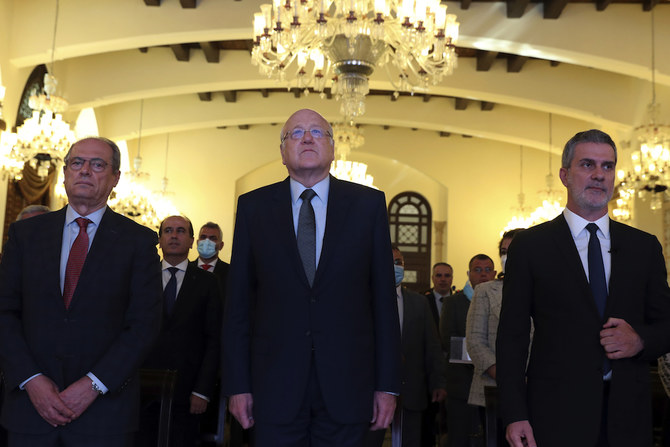
By Najia Houssari -- arabnews.com -- BEIRUT: Lebanese Prime Minister Najib Mikati was on Friday awaiting the results of behind-the-scenes consultations aimed at bridging the gap within his government and mending ties with Saudi Arabia and other Gulf countries, after they severed diplomatic and economic ties with Beirut in protest over statements made by Information Minister George Kordahi. MP Ali Darwish, a member of Mikati’s parliamentary bloc, told Arab News: “Through the roadmap that Mitaki announced on Thursday, he put forward an initiative to defuse the crisis." Darwish stressed that Mikati “is a moderate man by nature over whom there is consensus, which is essential in a country like Lebanon, so it is crucial for him to carefully and wisely handle issues.” Mikati had once again called on Kordahi to “follow his conscience and prioritize national interest.” Kordahi, however, is refusing to resign from the government.
Speaking about the possibility of Mikati’s government falling if Kordahi and his political team stand firm, Darwish said: “Mikati understands the Lebanese situation and believes that as long as he is prime minister, he can help Lebanon maintain good relations with the Arab countries.” Darwish added: “If Mikati were to resign, Lebanon could face unimaginable consequences.” The MP also said the current government “is based on a formula that brings together all the Lebanese, and if we were to lose the executive authority, we would be stripping Lebanon of the decision-making authority.” Speaking on behalf of the anti-Hezbollah Sovereign Front, former Interior Minister Maj. Gen. Ashraf Rifi said: “Hezbollah formed governments based on its interests, controlled the state and took it hostage for Iran’s sake.” He called on Mitaki to resign, saying: “You are the prime minister of a dysfunctional government, and the country does not need more Hezbollah governments.” Rifi noted: “This entire regime needs to leave, starting with the president from Hell, Michel Aoun. We need to steer away from the axis of evil, and justice must be applied.”
BEIRUT (Reuters) – Lebanon’s tourism minister unveiled a new slogan for the crisis-swept country on Thursday that aimed to portray the precarity of life there as a point of pride, roughly translating to “I love you in your madness”. Lebanon is suffering a financial and economic meltdown which the World Bank has labelled as one of the deepest depressions of modern history, compounded by the COVID-19 pandemic and a massive explosion at Beirut’s port that destroyed large parts of the city and killed more than 215 people. “This will be our touristic identity that the world will see,” Tourism Minister Walid Nassar said at a news conference with other senior ministers in Beirut. The slogan was developed cost-free for Lebanon by Dubai-based advertising company TBWA, he said. TBWA Chief Creative Officer Walid Kanaan said it was “near-impossible” to find ways to market a country in the grip of multi-layered economic and political crises, but that he had found inspiration in Lebanon’s people. “This is our country, a crazy country … crazy in its nightlife, crazy in its food and generosity. And no matter how crazy the situation in Lebanon is, we can only say, ‘we love you in your madness,'” Kanaan said, unveiling the slogan.
Originally a lyric in a song by Lebanese star singer Fairuz released before the outbreak of Lebanon’s 1975-90 civil war, the new catchphrase will be displayed on planes of Lebanon’s national carrier Middle East Airlines and used in social media campaigns, Kanaan said. The official English translation will be “A crazy love.” Tourism, historically a major component of Lebanon’s economy, has dramatically declined since late 2019. Some 2 million tourists visited the country in 2018, according to the former tourism minister, while media reports citing official figures suggest that numbers fell to a few hundred thousand in 2020.
by english.alaraby.co.uk — Lebanese Jews on Monday attended a “family gathering” held by Beirut’s representation at the embassy in Paris, Lebanese news …
Khazen History


Historical Feature:
Churches and Monasteries of the Khazen family

St. Anthony of Padua Church in Ballouneh
Mar Abda Church in Bakaatit Kanaan
Saint Michael Church in Bkaatouta
Saint Therese Church in Qolayaat
Saint Simeon Stylites (مار سمعان العامودي) Church In Ajaltoun
Virgin Mary Church (سيدة المعونات) in Sheilé
Assumption of Mary Church in Ballouneh
1 - The sword of the Maronite Prince
2 - LES KHAZEN CONSULS DE FRANCE
3 - LES MARONITES & LES KHAZEN
4 - LES MAAN & LES KHAZEN
5 - ORIGINE DE LA FAMILLE
Population Movements to Keserwan - The Khazens and The Maans
ما جاء عن الثورة في المقاطعة الكسروانية
ثورة أهالي كسروان على المشايخ الخوازنة وأسبابها
Origins of the "Prince of Maronite" Title
Growing diversity: the Khazin sheiks and the clergy in the first decades of the 18th century
Historical Members:
Barbar Beik El Khazen [English]
Patriach Toubia Kaiss El Khazen(Biography & Life Part1 Part2) (Arabic)
Patriach Youssef Dargham El Khazen (Cont'd)
Cheikh Bishara Jafal El Khazen
Patriarch Youssef Raji El Khazen
The Martyrs Cheikh Philippe & Cheikh Farid El Khazen
Cheikh Nawfal El Khazen (Consul De France)
Cheikh Hossun El Khazen (Consul De France)
Cheikh Abou-Nawfal El Khazen (Consul De France)
Cheikh Francis Abee Nader & his son Yousef
Cheikh Abou-Kanso El Khazen (Consul De France)
Cheikh Abou Nader El Khazen
Cheikh Chafic El Khazen
Cheikh Keserwan El Khazen
Cheikh Serhal El Khazen [English]
Cheikh Rafiq El Khazen [English]
Cheikh Hanna El Khazen
Cheikha Arzi El Khazen
Marie El Khazen